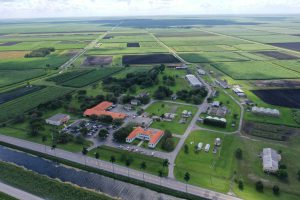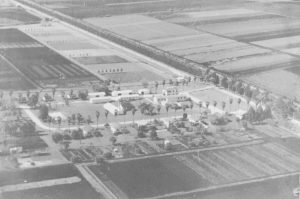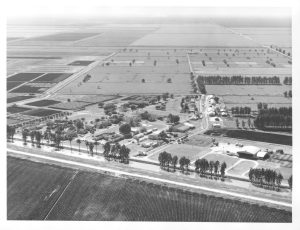
Since 1921, the UF/IFAS Everglades Research and Education Center (EREC) has built a rich history and world-class reputation for its commitment to growers, promoting sustainable agricultural systems and protecting South Florida’s natural resources.
On February 10, UF/IFAS administrators, scientists, faculty and students will host a centennial program at EREC to commemorate more than 100 years of science, service and Extension programs for growers and communities. The center, in the heart of the Everglades Agricultural Area (EAA), is at 3200 East Palm Beach Road in Belle Glade.
Dignitaries, faculty, producers and stakeholders will join in commemorating partnerships and innovations as part of a program showcasing EREC’s history, milestones, current research projects and future. The program begins at 7:45 a.m. with breakfast and opening remarks by Scott Angle, UF Senior Vice President for Agriculture and Natural Resources and leader of UF/IFAS, and Samira Daroub, EREC’s center director. The program includes tours of the facility’s labs and grounds and highlights of various research projects.
“We are very proud of EREC’s history and our strong relationship with the EAA community,” said Daroub. “Plant breeding and production research conducted at EREC have been instrumental in the development and success of the sweet corn, lettuce, turf, sugarcane and other crop industries in the EAA.”
Daroub also touts the best-management practices research and extension program conducted in collaboration with growers and
the South Florida Water Management District.
“The BMP program has been highly successful with water flowing from farmlands in the EAA, achieving total phosphorus reductions that significantly exceed those required by law,” she said.

EREC’s beginnings took root in 1921 when the Florida Legislature authorized the creation of the Everglades Experiment Station on lands near Belle Glade. In 1923, construction of the Experiment Station officially began, but the wild terrain of the Everglades coupled with the forces of nature — including hurricanes — brought many setbacks. Still, researchers made early important discoveries.
In 1924, the first experiments involving grasses and forage crops, fruit trees, pineapples, corn, rice and sugar cane were planted. Throughout its history, EREC boasts many pioneering scientists starting with Herman Wedgworth, the first plant pathologist at the center. R.V. Allison discovered how copper deficiency in the organic soils of the EAA was causing crop failures at the time.
Emil Wolf revolutionized the sweet corn industry in Florida by initiating a breeding program and discovering a key gene that made the corn sweeter. His discovery and program led to a growing and stable market.
Victor Guzman released several varieties of crisp head, romaine and Bibb lettuces that were vital to the growth of that industry in the EAA.
Joe Orsenigo developed environmentally safe herbicide application programs for various crops for EAA farmers.
George Snyder conducted pioneer work on silica and other nutrients for rice and sugarcane and sustainability of the organic soils.

Today, EREC’s campus has grown to include laboratories, greenhouses, a 700-acre research farm, offices, a conference center, residential dormitories and housing for graduate students and visiting scientists. EREC world-renowned research covers a wide range of fields including agronomy, entomology and nematology, horticultural sciences, plant pathology, and soil and water sciences.
The area’s growers are also supported by regional Extension agents based at EREC and at other UF/IFAS Extension offices in the EAA. A team of nine faculty members and 80 graduate students, post-doctoral associates and staff at collaborate to support for the EAA’s dynamic, agriculturally diverse region, which includes sugarcane, rice, commercial sod, and winter vegetables like sweet corn and leafy greens.
The public is invited to attend the anniversary event and can enjoy exhibits and tours of the facility. Visitors will have an opportunity to meet the center’s research faculty members, international visiting scientists and graduate students. To register, visit the EREC website at https://erec.ifas.ufl.edu/ and look for the SAVE THE DATE event on the revolving banner or register on this Eventbrite link.
ABOUT UF/IFAS
The mission of the University of Florida Institute of Food and Agricultural Sciences (UF/IFAS) is to develop knowledge relevant to agricultural, human and natural resources and to make that knowledge available to sustain and enhance the quality of human life. With more than a dozen research facilities, 67 county Extension offices, and award-winning students and faculty in the UF College of Agricultural and Life Sciences, UF/IFAS brings science-based solutions to the state’s agricultural and natural resources industries, and all Florida residents. ifas.ufl.edu | @UF_IFAS
 5
5
